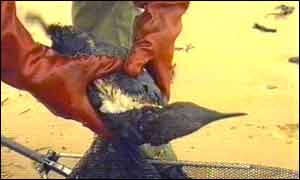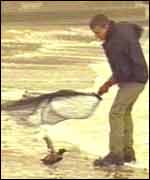|
The spokeswoman said it was not known what type of oil it was.
Birds washed
Guillemots, razorbills, great crested grebes and red-throated divers have mainly been affected by the slick.
After collection from the beach, the birds are initially being taken to the RSPCA wildlife hospital in East Winch, Norfolk, for washing and care.
When the hospital is full, they are taken to the charity's wildlife hospitals in Somerset and Cheshire.
Seals treated
Some of the grebes who were the first affected by the slick have been nursed, cleaned and re-released, said the spokeswoman.
The slick is the second major incident to be dealt with by the East Winch centre this year.
In the summer it treated seals affected by the phocine distemper virus, which wiped out large numbers of seals in the Wash area of Norfolk.
Anyone who finds an oiled seabird can call the Royal Society for the Prevention of Cruelty to Animals (RSPCA) on 0870 5555 999.
|

